Adam Jelley
Objects matter: object-centric world models improve reinforcement learning in visually complex environments
Jan 27, 2025Abstract:Deep reinforcement learning has achieved remarkable success in learning control policies from pixels across a wide range of tasks, yet its application remains hindered by low sample efficiency, requiring significantly more environment interactions than humans to reach comparable performance. Model-based reinforcement learning (MBRL) offers a solution by leveraging learnt world models to generate simulated experience, thereby improving sample efficiency. However, in visually complex environments, small or dynamic elements can be critical for decision-making. Yet, traditional MBRL methods in pixel-based environments typically rely on auto-encoding with an $L_2$ loss, which is dominated by large areas and often fails to capture decision-relevant details. To address these limitations, we propose an object-centric MBRL pipeline, which integrates recent advances in computer vision to allow agents to focus on key decision-related elements. Our approach consists of four main steps: (1) annotating key objects related to rewards and goals with segmentation masks, (2) extracting object features using a pre-trained, frozen foundation vision model, (3) incorporating these object features with the raw observations to predict environmental dynamics, and (4) training the policy using imagined trajectories generated by this object-centric world model. Building on the efficient MBRL algorithm STORM, we call this pipeline OC-STORM. We demonstrate OC-STORM's practical value in overcoming the limitations of conventional MBRL approaches on both Atari games and the visually complex game Hollow Knight.
Efficient Offline Reinforcement Learning: The Critic is Critical
Jun 19, 2024Abstract:Recent work has demonstrated both benefits and limitations from using supervised approaches (without temporal-difference learning) for offline reinforcement learning. While off-policy reinforcement learning provides a promising approach for improving performance beyond supervised approaches, we observe that training is often inefficient and unstable due to temporal difference bootstrapping. In this paper we propose a best-of-both approach by first learning the behavior policy and critic with supervised learning, before improving with off-policy reinforcement learning. Specifically, we demonstrate improved efficiency by pre-training with a supervised Monte-Carlo value-error, making use of commonly neglected downstream information from the provided offline trajectories. We find that we are able to more than halve the training time of the considered offline algorithms on standard benchmarks, and surprisingly also achieve greater stability. We further build on the importance of having consistent policy and value functions to propose novel hybrid algorithms, TD3+BC+CQL and EDAC+BC, that regularize both the actor and the critic towards the behavior policy. This helps to more reliably improve on the behavior policy when learning from limited human demonstrations. Code is available at https://github.com/AdamJelley/EfficientOfflineRL
Aligning Agents like Large Language Models
Jun 06, 2024Abstract:Training agents to behave as desired in complex 3D environments from high-dimensional sensory information is challenging. Imitation learning from diverse human behavior provides a scalable approach for training an agent with a sensible behavioral prior, but such an agent may not perform the specific behaviors of interest when deployed. To address this issue, we draw an analogy between the undesirable behaviors of imitation learning agents and the unhelpful responses of unaligned large language models (LLMs). We then investigate how the procedure for aligning LLMs can be applied to aligning agents in a 3D environment from pixels. For our analysis, we utilize an academically illustrative part of a modern console game in which the human behavior distribution is multi-modal, but we want our agent to imitate a single mode of this behavior. We demonstrate that we can align our agent to consistently perform the desired mode, while providing insights and advice for successfully applying this approach to training agents. Project webpage at https://adamjelley.github.io/aligning-agents-like-llms .
Diffusion for World Modeling: Visual Details Matter in Atari
May 20, 2024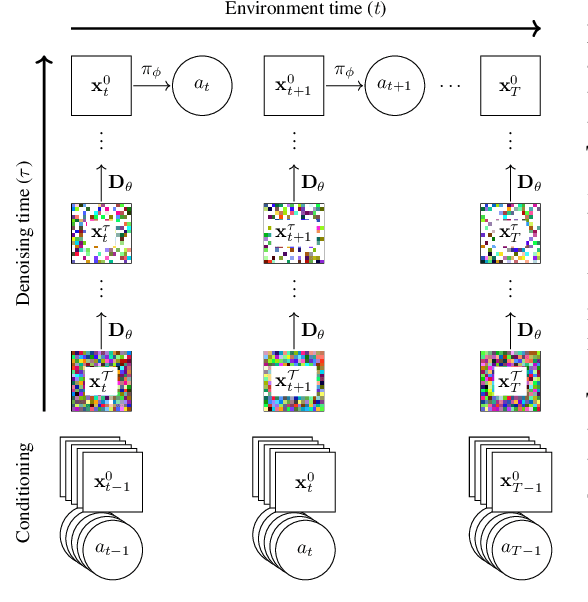
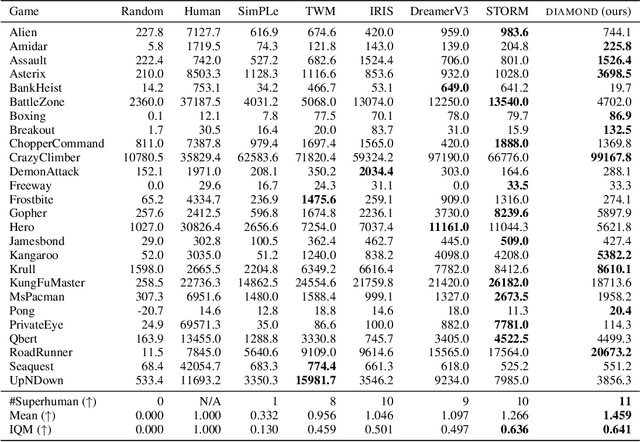
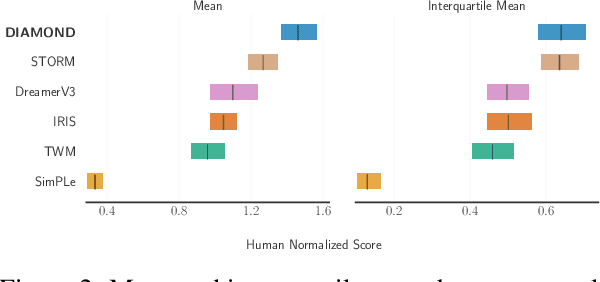
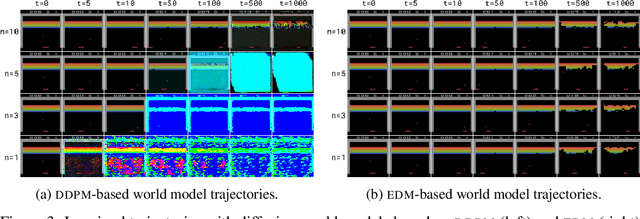
Abstract:World models constitute a promising approach for training reinforcement learning agents in a safe and sample-efficient manner. Recent world models predominantly operate on sequences of discrete latent variables to model environment dynamics. However, this compression into a compact discrete representation may ignore visual details that are important for reinforcement learning. Concurrently, diffusion models have become a dominant approach for image generation, challenging well-established methods modeling discrete latents. Motivated by this paradigm shift, we introduce DIAMOND (DIffusion As a Model Of eNvironment Dreams), a reinforcement learning agent trained in a diffusion world model. We analyze the key design choices that are required to make diffusion suitable for world modeling, and demonstrate how improved visual details can lead to improved agent performance. DIAMOND achieves a mean human normalized score of 1.46 on the competitive Atari 100k benchmark; a new best for agents trained entirely within a world model. To foster future research on diffusion for world modeling, we release our code, agents and playable world models at https://github.com/eloialonso/diamond.
LLM-Personalize: Aligning LLM Planners with Human Preferences via Reinforced Self-Training for Housekeeping Robots
Apr 22, 2024



Abstract:Large language models (LLMs) have shown significant potential for robotics applications, particularly task planning, by harnessing their language comprehension and text generation capabilities. However, in applications such as household robotics, a critical gap remains in the personalization of these models to individual user preferences. We introduce LLM-Personalize, a novel framework with an optimization pipeline designed to personalize LLM planners for household robotics. Our LLM-Personalize framework features an LLM planner that performs iterative planning in multi-room, partially-observable household scenarios, making use of a scene graph constructed with local observations. The generated plan consists of a sequence of high-level actions which are subsequently executed by a controller. Central to our approach is the optimization pipeline, which combines imitation learning and iterative self-training to personalize the LLM planner. In particular, the imitation learning phase performs initial LLM alignment from demonstrations, and bootstraps the model to facilitate effective iterative self-training, which further explores and aligns the model to user preferences. We evaluate LLM-Personalize on Housekeep, a challenging simulated real-world 3D benchmark for household rearrangements, and show that LLM-Personalize achieves more than a 30 percent increase in success rate over existing LLM planners, showcasing significantly improved alignment with human preferences. Project page: https://donggehan.github.io/projectllmpersonalize/.
Contrastive Meta-Learning for Partially Observable Few-Shot Learning
Jan 30, 2023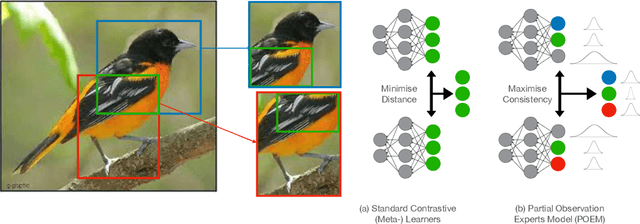

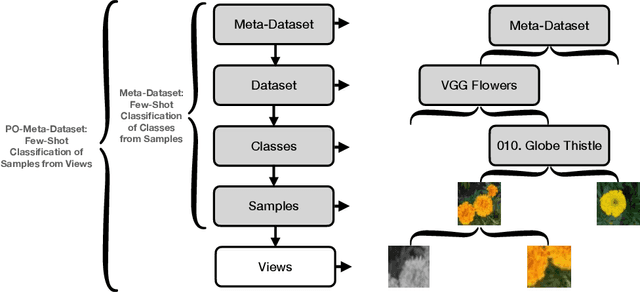

Abstract:Many contrastive and meta-learning approaches learn representations by identifying common features in multiple views. However, the formalism for these approaches generally assumes features to be shared across views to be captured coherently. We consider the problem of learning a unified representation from partial observations, where useful features may be present in only some of the views. We approach this through a probabilistic formalism enabling views to map to representations with different levels of uncertainty in different components; these views can then be integrated with one another through marginalisation over that uncertainty. Our approach, Partial Observation Experts Modelling (POEM), then enables us to meta-learn consistent representations from partial observations. We evaluate our approach on an adaptation of a comprehensive few-shot learning benchmark, Meta-Dataset, and demonstrate the benefits of POEM over other meta-learning methods at representation learning from partial observations. We further demonstrate the utility of POEM by meta-learning to represent an environment from partial views observed by an agent exploring the environment.
 Add to Chrome
Add to Chrome Add to Firefox
Add to Firefox Add to Edge
Add to Edge